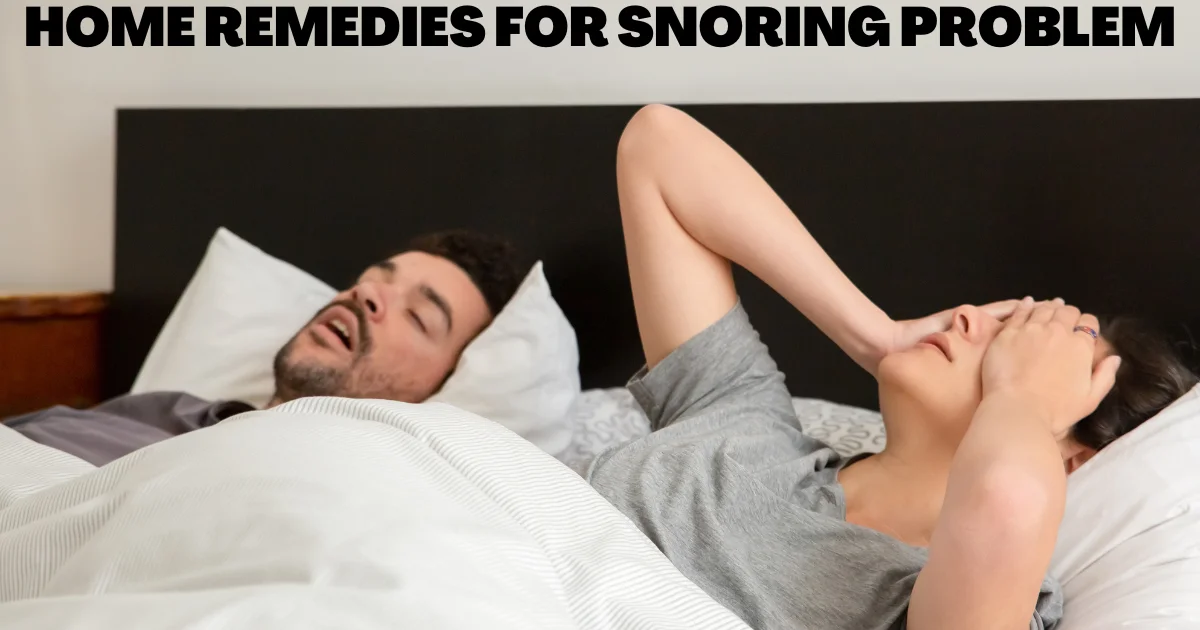Snoring is a common problem that affects a large percentage of the population. It occurs when the flow of air through the mouth and nose is partially blocked during sleep, causing vibrations in the throat and producing a sound. While snoring is often considered a nuisance, it can also be a sign of a more serious underlying medical condition such as sleep apnea, a disorder in which breathing repeatedly stops and starts during sleep. Snoring can lead to poor quality sleep, daytime fatigue, irritability, and other health problems if left untreated. Treatment options range from lifestyle changes and over-the-counter remedies to medical devices and surgery.

22 home remedies for snoring problem
1.Change sleeping position: Sleeping on your side can help reduce snoring as it prevents the tongue from falling back into the throat.
2.Lose weight: Carrying excess weight, especially around the neck area, can increase the risk of snoring. Losing weight can help reduce snoring.
also read.. sleep apnea insomnia sleeping problem and solution
3.Avoid alcohol: Consuming alcohol before bed can relax the muscles in the throat, leading to snoring.
4.Practice good sleep hygiene: Ensure that you get adequate sleep and stick to a regular sleep schedule.
5.Keep your nasal passages open: Clear your nasal passages by using a saline spray or a neti pot.
6.Try an oral appliance: Devices like mandibular advancement devices and tongue stabilizing devices can help reduce snoring.
7.Use a humidifier: Adding moisture to the air can help reduce snoring caused by dry air.
8.Stay hydrated: Drinking enough water can help keep the mucus membranes in the throat hydrated, reducing snoring.
9.Avoid sedatives: Sedatives can relax the muscles in the throat, leading to snoring.
10.Practice throat exercises: Strengthening the muscles in the throat can help reduce snoring.
11.Try essential oils: Essential oils like eucalyptus, peppermint, and lavender can help reduce inflammation and clear nasal passages.
12.Elevate your head: Sleeping with your head elevated can help reduce snoring.
13.Use a tennis ball: Sew a tennis ball onto the back of your pajama top to prevent you from sleeping on your back.
14.Limit caffeine: Caffeine can interfere with sleep, leading to snoring.
15.Quit smoking: Smoking can cause inflammation in the throat, leading to snoring.
16.Use a nasal strip: Nasal strips can help open up the nasal passages, reducing snoring.
17.Practice good oral hygiene: Poor oral hygiene can cause infections and inflammation in the throat, leading to snoring.
18.Avoid heavy meals before bedtime: Heavy meals can cause indigestion, leading to snoring.
19.Try throat sprays: Throat sprays can help reduce inflammation and lubricate the throat.
20.Practice relaxation techniques: Practicing relaxation techniques like deep breathing and meditation can help reduce snoring.
21.Try a steam shower: A steam shower can help open up the nasal passages, reducing snoring.
22.Sleep on a firm mattress: Sleeping on a firm mattress can help keep the airway open, reducing snoring.
Conclusion
In conclusion, snoring is a common sleep issue that can affect people of all ages and genders. It is often a symptom of an underlying issue such as sleep apnea, obesity, nasal congestion, or smoking. While snoring itself is not necessarily harmful, chronic snoring and sleep apnea can negatively impact quality of life and overall health, increasing the risk of cardiovascular disease, stroke, and other health problems.
Fortunately, there are various treatment options available for snoring, including lifestyle changes, home remedies, and medical interventions . It’s important to address snoring and other sleep disturbances to help improve sleep quality and overall well-being. If you or a loved one are experiencing snoring or other sleep issues, it’s best to speak with a healthcare professional to determine the underlying cause and determine the best course of treatment.
Disclaimer: The advice and suggestions mentioned in the article are for general information purpose only and it should not be taken as professional medical advice. Always consult your doctor if you have any questions or concerns.
FAQ-
Is snoring a serious problem?
Snoring itself is not always a serious problem, but it can be a sign of an underlying medical condition such as sleep apnea. Sleep apnea is a disorder in which breathing repeatedly stops and starts during sleep, and it can lead to serious health problems such as high blood pressure, heart disease, and stroke if left untreated.
Is it normal to snore every night?
While it is common for some people to snore occasionally, snoring every night may not be normal. Snoring can be a sign of an underlying medical condition such as sleep apnea or nasal congestion, which may require medical attention. Snoring every night can also affect the quality of one's sleep and lead to daytime fatigue, irritability, and other health problems. Therefore, if you or someone you know snore regularly, it is important to speak with a healthcare professional to determine the underlying cause and determine the best course of treatment.
Can snoring go away?
Snoring can go away, depending on the underlying cause. If snoring is caused by lifestyle factors such as alcohol consumption or excess weight, making changes to these habits can help reduce or eliminate snoring. In addition, if snoring is caused by nasal congestion or allergies, using nasal sprays or allergy medications can help reduce snoring.
Can snoring be cured naturally ?
Snoring can sometimes be cured naturally, depending on the underlying cause. Here are some natural remedies that may help reduce snoring: 1.Sleeping on your side: Sleeping on your back can cause the tongue and soft palate to collapse to the back of the throat, leading to snoring. Sleeping on your side can help reduce snoring. 2.Weight loss: Excess weight can contribute to snoring. Losing weight through a healthy diet and exercise may help reduce snoring. 3.Avoiding alcohol and sedatives: Alcohol and sedatives can relax the muscles in the throat, leading to snoring. Avoiding them before bed may help reduce snoring. 4.Humidifying the air: Dry air can irritate the throat and nasal passages, leading to snoring. Using a humidifier to add moisture to the air may help reduce snoring. 5.Nasal strips: Nasal strips can help keep the nasal passages open, making it easier to breathe through the nose and reducing the risk of snoring.
Can stress cause snoring ?
Yes, stress can be a contributing factor to snoring. When we are stressed, our bodies produce hormones that can cause inflammation and lead to nasal congestion, which can in turn lead to snoring. Stress can also cause muscle tension and poor sleep quality, which can make snoring worse.
What are the 5 causes of snoring ?
There are various causes of snoring, but here are five common ones: 1.Sleep Apnea: Sleep apnea is a serious sleep disorder that causes a person to stop breathing periodically during sleep. It can lead to snoring and other symptoms such as excessive daytime sleepiness, gasping for air during sleep, and morning headaches. 2.Obesity: Excess weight can lead to the accumulation of fat around the neck, which can narrow the airway and lead to snoring. 3.Nasal and Sinus Problems: Nasal congestion, sinus infections, and allergies can cause inflammation and blockages in the airway, leading to snoring. 4.Alcohol and Sedative Use: Alcohol and sedatives can relax the muscles in the throat, leading to snoring. 5.Sleeping Position: Sleeping on your back can cause the tongue and soft palate to collapse to the back of the throat, leading to snoring. Sleeping on your side may help reduce snoring.
Does snoring affect the brain ?
Yes, snoring can affect the brain. Snoring is often associated with sleep disturbances, including interruptions in breathing and decreases in oxygen levels, which can lead to a condition called sleep apnea. Sleep apnea has been linked to various neurological effects, including changes in brain structure, cognitive impairment, and an increased risk of dementia.
Is snoring a deficiency ?
Snoring is not a deficiency, but rather a symptom of an underlying issue, such as sleep apnea, nasal congestion, or obesity, among others. Snoring can occur when the airway becomes partially blocked during sleep, causing vibrations in the throat tissue that produce the sound of snoring.
Who suffers from snoring ?
Snoring can affect people of all ages and genders, but it is more common in certain groups. Men are more likely to snore than women, and snoring tends to become more prevalent with age. However, snoring can affect anyone regardless of gender, age, or health status.



